HOW THE DESIGN OF PRODUCT-SERVICE SYSTEMS CAN IMPROVE THE LIFE OF PEOPLE WITH VISUAL IMPAIRMENT
DOI:
https://doi.org/10.29183/2447-3073.MIX2020.v6.n3.157-164Palavras-chave:
Contemporary Design, Assistive Technology, Social Sustainability.Resumo
The field of contemporary design has been changing its purposes and has increasingly been working in multiple areas. The technological capacity related to design has been allowing professionals to help people with various disabilities through assistive technologies. For this purpose, the Product-Service System (PSS) has been proven very much appropriate with its tools for creating solutions with an intense degree of concern for details and broad insight into the targeted matter. PSS is a user-centered design approach that also embarks discussions about social sustainability and environmental issues. This article aims to analyze a case study that resulted in the development of a solution through PSS. By the end, it presents a discussion about the advantages of this approach and how designing through PSS can provide solutions for visually impaired people.Referências
BERSCH, R. Introdução à Tecnologia Assistiva. Assistiva - Tecnologia e Educação, Porto Alegre, 2017.
BOTSMAN, R. Ideas for modern living: collaborative consumption. 2011. Retrivied from: https://www.theguardian.com/lifeandstyle/2011/jan/30/ideas-modern-living-collaborative-consumptio. Access in Nov. 2019.
CARVALHO, F. J. C. et al. Economia monetária e financeira: teoria e política. 2. ed. Rio de Janeiro: Elsevier: Campus, 2007.
FUNDAÇÃO DORINA NOWILL PARA CEGOS. Tecnologia Assistiva. n.d. Retrivied from: https://www.fundacaodorina.org.br/a-fundacao/deficiencia-visual/tecnologia-assistiva/. Access in Nov. 2019.
FUNDAÇÃO DORINA NOWILL PARA CEGOS. Homepage. n.d. Retrivied from: https://www.fundacaodorina.org.br/. Access in Nov. 2019.
HENRY, S. L. Just Ask: Integrating Accessibility Throughout Design. United States: Lulu.com, 2007.
IBGE - Instituto Brasileiro de Geografia e Estatística (Org.). Panorama nacional e internacional da produção de indicadores sociais: grupos populacionais específicos e uso do tempo. Rio de Janeiro, 2018.
KAZAZIAN, Thierry. Haverá a idade das coisas leves: design e desenvolvimento sustentável. São Paulo: Editora Senac São Paulo, 2005.
MANZINI, E.; VEZZOLI, C. A strategic design approach to develop sustainable product-service systems: examples taken from the “environmentally friendly innovation’ Italian prize. Journal of Cleaner Production, v. 11(8), p. 851-857, 2003.
MANZINI, E.; VEZZOLI, C; CLARK, G. Product-service systems: using an existing concept as a new approach to sustainability. Journal of Design Research, v. 1(2), 2017. Retrivied from: https://www.inderscienceonline.com/doi/abs/10.1504/JDR.2001.009811. Access in Nov. 2019.
MCALOONE, T.; ANDREASEN, M. Defining Product-Service Systems. Design for X, Beiträge Zum 13. Symposium, 2002.
PETRULAITYTE, A. Distributed Manufacturing applied to Product-Service Systems: a scenario-based design toolkit. 2019. Thesis (Doctorate in Design) – Department of Design, Brunel University, London, 2019.
PHILLIPS, M.; PROULX, M. J. Social Interaction Without Vision: an Assessment of Assistive Technology for the Visually Impaired. Technology and Innovation, v. 20, p. 85-93, 2018.
RASOULI, M. R. et al. A Dynamic Capabilities Perspective on Service-Orientation in Demand-Supply Chains. Procedia CIRP, v. 30, p. 396 – 401, 2015.
SASSANELLI, C. et al. Towards a Lean Product Service Systems (PSS) Design: state of the art, opportunities and challenges. Procedia CIRP, v. 30, p. 191 – 196, 2015.
SERVICE DESIGN TOOLS. System Map. n.d. Retrieved from: https://servicedesigntools.org/tools/system-map. Access in Nov. 2019.
THACKARA, J. In the bubble: designing in a complex world. Cambridge: The MIT Press, 2005.
VARGO, S. L.; LUSCH, R. F. Evolving to a New Dominant Logic for Marketing. Journal of Marketing, v. 68, p. 1-17, 2004.
VEZZOLI, C. et al. Sistema produto + serviço sustentável: fundamentos. Curitiba: Insight, 2018.
VIANNA, Maurício et al. Design Thinking: inovação em negócios. Rio de Janeiro: MJV Press, 2012.
Downloads
Publicado
Edição
Seção
Licença
Aviso de Direito Autoral Creative Commons
1. Política para Periódicos de Acesso Livre
Autores que publicam nesta revista concordam com os seguintes termos:
a. Autores mantém os direitos autorais e concedem à revista o direito de primeira publicação, com o trabalho simultaneamente licenciado sob a Licença Creative Commons Attribution que permite o compartilhamento do trabalho com reconhecimento da autoria e publicação inicial nesta revista.
b. Autores têm autorização para assumir contratos adicionais separadamente, para distribuição não-exclusiva da versão do trabalho publicada nesta revista (ex.: publicar em repositório institucional ou como capítulo de livro), com reconhecimento de autoria e publicação inicial nesta revista.
c. Autores têm permissão e são estimulados a publicar e distribuir seu trabalho online (ex.: em repositórios institucionais ou na sua página pessoal) a qualquer ponto após o processo editorial, já que isso pode gerar alterações produtivas, bem como aumentar o impacto e a citação do trabalho publicado (Veja O Efeito do Acesso Livre).




